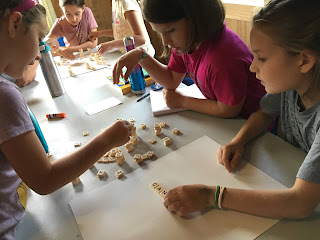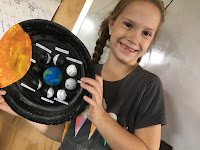 It was a great day on the farm! The kids filed in and worked together to complete their animal care chores. They will continue to get the hang of these assignments before we rotate. By the end of the year, they will be experts at all of the animals!
It was a great day on the farm! The kids filed in and worked together to complete their animal care chores. They will continue to get the hang of these assignments before we rotate. By the end of the year, they will be experts at all of the animals!The kids shared their flower assignments from home. I loved hearing about their hobbies, favorite foods, sports, and more!
The kids learned different goat related terms today. They learned to say "doe" instead of "nanny" and "buck" instead of "billy". We talked about kids, wethers, doelings, bucklings, and more. I explained that "wether" is a homophone. This led us to discuss other examples of homophones. For instance, when a pig has piglets, we say that she has "farrowed". The word "farrow" is also a homophone... and the students thought it was funny that the word for an Egyptian leader would have the same sound as the word for a pig having babies!
Next, the class broke up into two groups. One group headed inside to finish their ar
t projects, while the other made their way to the goat stand to help me trim the goat's hooves. The class was able to see how the goats jump up on the stand and love to pig out of grain during their pedicures. Unfortunately, this class also had a trim the stinky bucks. It was a little smelly in our classroom for th
e rest of the day!
t projects, while the other made their way to the goat stand to help me trim the goat's hooves. The class was able to see how the goats jump up on the stand and love to pig out of grain during their pedicures. Unfortunately, this class also had a trim the stinky bucks. It was a little smelly in our classroom for th
e rest of the day!
At home, the kids will be writing a little story about hoof trimming... from the goat's point of view. I can't wait to hear them!
During science class, we reviewed the material from chapters 4 & 5. They did a great job on their online quiz, and I believe we will continue those in the future. We had a group activity, and then the class discussed different ancient numeric systems. We used the Egyptian number system to press our birth years into clay. These will be dried and sent home next week.
 In grammar, the students were given corrections for the three lessons that were completed at home. It's important for them to have time to look over the corrections and ask questions, if needed. I will make sure to continue to give time for this at the beginning of each grammar class. We discussed different types of nouns: ,singular plural, compound, possessive, and collective. We also talked about different ways to spell plural nouns. For instance, if a noun ends with s, z, x, ch, or sh, you must add an -es instead of just an -s. We also talked about when to add an -s to a word that ends with a y and when to change the y to an I before adding -es. In order to practice this, the class broke up into groups. They were given singular words and worked together to form the plural using letter tiles. I think this was a winner! The kids loved it!
In grammar, the students were given corrections for the three lessons that were completed at home. It's important for them to have time to look over the corrections and ask questions, if needed. I will make sure to continue to give time for this at the beginning of each grammar class. We discussed different types of nouns: ,singular plural, compound, possessive, and collective. We also talked about different ways to spell plural nouns. For instance, if a noun ends with s, z, x, ch, or sh, you must add an -es instead of just an -s. We also talked about when to add an -s to a word that ends with a y and when to change the y to an I before adding -es. In order to practice this, the class broke up into groups. They were given singular words and worked together to form the plural using letter tiles. I think this was a winner! The kids loved it!



 In literature, we talked about the last few chapters that they read in Indian in the Cupboard. They turned in their reading comprehension questions, which will be given back next week. They completed a quick vocabulary review before heading to form a big circle "around the fire". Since they have been learning about the Iroquois customs, I felt it would be best to read their writing assignments "around the fire" instead of sitting at tables and in chairs.
In literature, we talked about the last few chapters that they read in Indian in the Cupboard. They turned in their reading comprehension questions, which will be given back next week. They completed a quick vocabulary review before heading to form a big circle "around the fire". Since they have been learning about the Iroquois customs, I felt it would be best to read their writing assignments "around the fire" instead of sitting at tables and in chairs. At home, the kids wrote a story about what it would have been like if they had joined Little Bear and come to life in miniature. These were great! There were some incredibly funny and well-written stories, and the class loved hearing each others' ideas. After each student read their stories, I gifted them with their very own "magic key", just like in the story.























































